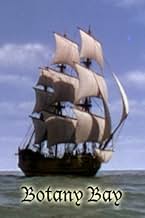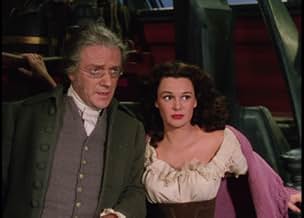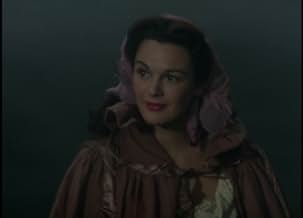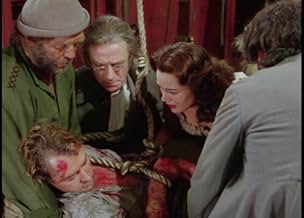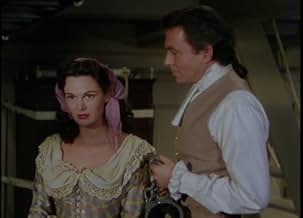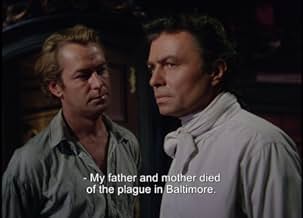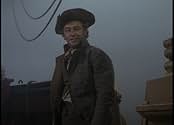VALUTAZIONE IMDb
6,1/10
691
LA TUA VALUTAZIONE
Aggiungi una trama nella tua linguaIn 1787, American medical student Hugh Tallant and British convicts are sent from London to New South Wales on a ship commanded by the evil Captain Gilbert.In 1787, American medical student Hugh Tallant and British convicts are sent from London to New South Wales on a ship commanded by the evil Captain Gilbert.In 1787, American medical student Hugh Tallant and British convicts are sent from London to New South Wales on a ship commanded by the evil Captain Gilbert.
- Regia
- Sceneggiatura
- Star
Cedric Hardwicke
- Gov. Phillips
- (as Sir Cedric Hardwicke)
Anita Sharp-Bolster
- Moll Cudlip
- (as Anita Bolster)
Brandon Toomey
- Guard
- (as Brendan Toomey)
Patrick Aherne
- Bo's'n's Mate
- (non citato nei titoli originali)
John Albright
- Sailor
- (non citato nei titoli originali)
Walter Bacon
- Prisoner
- (non citato nei titoli originali)
Recensioni in evidenza
This was a speciality of Paramount Pictures to make adventures yarns: see for instance Edward Ludwig or even Lewis R Foster's colourful flicks. This one makes no exception, it remains in the house tradition and style, atmosphere and efficiency too. Alan Ladd does his job with not great conviction but that's OK. Mason is good as the evil captain, though not being Chuck Laughton in the 1936 version. Good movie for adventures features moviegoers.
After American independence the British government could no longer send convicted criminals to the Thirteen Colonies, so decided to send them to Australia instead. (For some reason Canada was not considered). "Botany Bay" is a highly fictionalised account of the voyage of the First Fleet which brought the first convicts to Australia. In reality the fleet consisted of eleven ships, but the film deals with only one of these, the "Charlotte", and gives the misleading impression that the ship sailed on its own. Some of the characters, such as Governor Philip and Captain Gilbert of the "Charlotte", were real historical figures, but others are fictitious. Gilbert's Christian name was Thomas, but here for some reason he is renamed "Paul", possibly in order to distance him from the real Thomas Gilbert, who does not appear to have been the villain depicted here.
This was an American-made film, so there has to be an American hero, Hugh Tallant, a medical student convicted of robbery. He claims that the money he took was rightfully his and was being withheld from him by a corrupt lawyer, a claim which seems to have been accepted by the authorities, because he has been pardoned by King George III. The messenger bearing the pardon, however, does not arrive at the docks until after the ship has sailed. Tallant has already read of his pardon in a newspaper and begs Gilbert to await the arrival of the messenger, but the captain refuses. There also has to be a beautiful heroine, in this case Sally Munroe, a young actress convicted of stealing a necklace. Despite the rigours of a long voyage lasting several months, Sally is just as beautiful, with the same immaculate hair and make-up, when the ship arrives in Australia as she was when it left Britain.
Despite the title, the film deals much more with the voyage than it does with what happens when the ship reaches Botany Bay. Some, observing the similarities between James Mason's Gilbert, who tyrannises over both the prisoners and his crew, and Captain Bligh, have described it as an unacknowledged remake of the 1935 version of "Mutiny on the Bounty", which is perhaps not surprising as the two films were based upon novels by the same authors, Charles Nordhoff and James Norman Hall. (Nordhoff and Hall normally collaborated on their books).
I would not, however, rate it as highly as the earlier film, for a number of reasons. Mason could on occasions give decent performances even in otherwise mediocre films, such as "The Reckless Moment", but he is unable to rescue "Botany Bay", which must count as one of his worst films. Unlike Charles Laughton as Bligh in "Mutiny on the Bounty" (or Trevor Howard in the remake), Mason never really makes us believe in Gilbert's cruelty or tyranny, largely because neither he nor the scriptwriters seem able to decide what sort of man Gilbert is. Is he simply a bully? Or a sadist who tries to hide his sadism behind a thin veneer of gentlemanly behaviour? Or a man whose character gradually deteriorates because of the corrupting effect of power? All three interpretations would be possible, but Mason and the film-makers can never seem to decide which one they favour.
The film's main weakness, however, is not so much the characterization of the villain as the characterization of the hero. Or, I should say, of the supposed hero. Tallant comes across as not just a complete jerk but a complete idiot as well. When Gilbert discovers the truth about Tallant's pardon and his medical training he makes him the surprisingly generous offer of the position of ship's surgeon. Tallant, however, is so eaten up with resentment that he refuses this offer and instead makes various foolish and ill-conceived attempts to escape. Worse still, he offers £1000 to any person who will help him in these attempts, which only brings Gilbert's wrath down upon these persons' heads as well as Tallant's own when the attempts inevitably fail. Yet despite this combination of boorishness and stupidity, we are still supposed to find Tallant likeable. Alan Ladd could be a very good actor, as he was in that great classic "Shane", but he could also fall well short of that standard, as he does here.
The film also suffers from historical errors. Gilbert wants to have Tallant charged with mutiny, which would not have been possible, even if the "Charlotte" were a Royal Navy ship, because Tallant is not a person subject to naval discipline. Also, Gilbert has Tallant keelhauled, a punishment not used on British ships. ("Mutiny on the Bounty" also included a historically unwarranted keelhauling incident). Although the film was made at a time when some Hollywood Westerns were trying to get away from the once-common stereotype of Native Americans as bloodthirsty savages, the Australian Aborigines (played by Afro-American actors) are portrayed in precisely that unenlightened way. "Botany Bay" is the sort of historical drama that gets historical dramas a bad name. 4/10
This was an American-made film, so there has to be an American hero, Hugh Tallant, a medical student convicted of robbery. He claims that the money he took was rightfully his and was being withheld from him by a corrupt lawyer, a claim which seems to have been accepted by the authorities, because he has been pardoned by King George III. The messenger bearing the pardon, however, does not arrive at the docks until after the ship has sailed. Tallant has already read of his pardon in a newspaper and begs Gilbert to await the arrival of the messenger, but the captain refuses. There also has to be a beautiful heroine, in this case Sally Munroe, a young actress convicted of stealing a necklace. Despite the rigours of a long voyage lasting several months, Sally is just as beautiful, with the same immaculate hair and make-up, when the ship arrives in Australia as she was when it left Britain.
Despite the title, the film deals much more with the voyage than it does with what happens when the ship reaches Botany Bay. Some, observing the similarities between James Mason's Gilbert, who tyrannises over both the prisoners and his crew, and Captain Bligh, have described it as an unacknowledged remake of the 1935 version of "Mutiny on the Bounty", which is perhaps not surprising as the two films were based upon novels by the same authors, Charles Nordhoff and James Norman Hall. (Nordhoff and Hall normally collaborated on their books).
I would not, however, rate it as highly as the earlier film, for a number of reasons. Mason could on occasions give decent performances even in otherwise mediocre films, such as "The Reckless Moment", but he is unable to rescue "Botany Bay", which must count as one of his worst films. Unlike Charles Laughton as Bligh in "Mutiny on the Bounty" (or Trevor Howard in the remake), Mason never really makes us believe in Gilbert's cruelty or tyranny, largely because neither he nor the scriptwriters seem able to decide what sort of man Gilbert is. Is he simply a bully? Or a sadist who tries to hide his sadism behind a thin veneer of gentlemanly behaviour? Or a man whose character gradually deteriorates because of the corrupting effect of power? All three interpretations would be possible, but Mason and the film-makers can never seem to decide which one they favour.
The film's main weakness, however, is not so much the characterization of the villain as the characterization of the hero. Or, I should say, of the supposed hero. Tallant comes across as not just a complete jerk but a complete idiot as well. When Gilbert discovers the truth about Tallant's pardon and his medical training he makes him the surprisingly generous offer of the position of ship's surgeon. Tallant, however, is so eaten up with resentment that he refuses this offer and instead makes various foolish and ill-conceived attempts to escape. Worse still, he offers £1000 to any person who will help him in these attempts, which only brings Gilbert's wrath down upon these persons' heads as well as Tallant's own when the attempts inevitably fail. Yet despite this combination of boorishness and stupidity, we are still supposed to find Tallant likeable. Alan Ladd could be a very good actor, as he was in that great classic "Shane", but he could also fall well short of that standard, as he does here.
The film also suffers from historical errors. Gilbert wants to have Tallant charged with mutiny, which would not have been possible, even if the "Charlotte" were a Royal Navy ship, because Tallant is not a person subject to naval discipline. Also, Gilbert has Tallant keelhauled, a punishment not used on British ships. ("Mutiny on the Bounty" also included a historically unwarranted keelhauling incident). Although the film was made at a time when some Hollywood Westerns were trying to get away from the once-common stereotype of Native Americans as bloodthirsty savages, the Australian Aborigines (played by Afro-American actors) are portrayed in precisely that unenlightened way. "Botany Bay" is the sort of historical drama that gets historical dramas a bad name. 4/10
Other reviewers of Botany Bay have complained about the lack of location shooting in this film. Two very good reasons for Paramount's decision to opt for the back lot. First it was expensive to go to Australia for an American company. I'm sure that there are Aussie films that deal with this particular portion of their history far better than Botany Bay.
But secondly this was the last picture on Alan Ladd's Paramount contract. He and his agent/wife Sue Carol made a decision to move to Warner Brothers so Paramount was getting rid of the last film on his contract. They were not about to spend big bucks promoting a star who wasn't going to be bringing in more box office for them.
Having said that Botany Bay is not a bad film and it certainly did give American audiences some idea about the founding of Australia as a haven for convict prisoners. One of our original 13 colonies, Georgia, was founded for just that reason also, but here a whole continent was devoted to same.
Ladd plays an American accused of being a highwayman in Great Britain. The fact he was an American probably played some role in his conviction so shortly after the American Revolution in the 1780s. He's saved from the hangman by this offer of pardon to go to Australia and he travels on a crowded ship, skippered by a sadistic captain.
Who is played by James Mason who basically steals the film. The novel on which this is based is by Nordhoff and Hall who wrote Mutiny on the Bounty and there's a whole lot of Captain Bligh in Mason. We've also got Patricia Medina, a saucy wench who likes Ladd, but flirts with Mason for her survival on the ship in some comfort.
Not a bad film, but not the greatest of send offs for one of Paramount's biggest stars.
But secondly this was the last picture on Alan Ladd's Paramount contract. He and his agent/wife Sue Carol made a decision to move to Warner Brothers so Paramount was getting rid of the last film on his contract. They were not about to spend big bucks promoting a star who wasn't going to be bringing in more box office for them.
Having said that Botany Bay is not a bad film and it certainly did give American audiences some idea about the founding of Australia as a haven for convict prisoners. One of our original 13 colonies, Georgia, was founded for just that reason also, but here a whole continent was devoted to same.
Ladd plays an American accused of being a highwayman in Great Britain. The fact he was an American probably played some role in his conviction so shortly after the American Revolution in the 1780s. He's saved from the hangman by this offer of pardon to go to Australia and he travels on a crowded ship, skippered by a sadistic captain.
Who is played by James Mason who basically steals the film. The novel on which this is based is by Nordhoff and Hall who wrote Mutiny on the Bounty and there's a whole lot of Captain Bligh in Mason. We've also got Patricia Medina, a saucy wench who likes Ladd, but flirts with Mason for her survival on the ship in some comfort.
Not a bad film, but not the greatest of send offs for one of Paramount's biggest stars.
A good premise: a gaggle of British convicts, male and female, are shipped to the new penal colony in Australia, circa 1780s. But while this story calls for great seascapes, Paramount gives us ship-in-a-soundstage scenes which are cramped and unconvincing. Even the later sequences in Australia have a "backlot" quality to them. Note the dark, sexually-ambiguous undertones in the performance of ship's captain, James Mason. Alan Ladd, who, like Burt Lancaster and Mel Gibson, liked to suffer in his movies, here gets to be flogged and later keelhauled. His flogging in "Two Years Before the Mast" is much more vivid but his keelhauling in "Botany Bay" marks the only time a Hollywood leading man has suffered this particular kind of punishment. Curiously, despite his penchant for "beefcake" scenes, Ladd remains fully clothed for this sequence. Perhaps the fear was that audiences would understandably expect a shirtless Ladd to suffer many cuts and abrasions on his bare torso while being scraped under the ship's keel, and Paramount didn't want to see its handsome leading man forced to look, even temporarily, disfigured or damaged.
Here's another film about transporting prisoners to Australia in the 18th century. I can't comment on the accuracy of the history here but this is a subject that often gets used as the backdrop to films or TV series. It does allow scope for adventure, a bit of swashbuckling, usually a dose of brutality and often a pretty heroine. All are present here with Alan Ladd as a doctor wrongly accused of highway robbery, the beautiful and perhaps underrated Patricia Medina as the heroine, Sir Cedric Hardwicke as the governor at Botany Bay and best of all, James Mason as the brutal sea captain giving one of his most charismatic performances ever that I've seen and that's many. Mason simply steals every scene he's in and you can't take your eyes off him and he certainly gives. Charles Laughton a run for the money in Mutiny On The Bounty. I understand it was all shot on backlots at Paramount which can give a claustraphobic feel when it needed opening up with location work but even so passes a couple of hours fairly successfully.
Lo sapevi?
- Citazioni
Capt. Paul Gilbert: [after sentencing Hugh Tallant to a 50-lash whipping] I don't want any danger of infection. Have you the salt ready for his wounds?
- ConnessioniFeatured in Never Fear Smith Is Here! (1994)
I più visti
Accedi per valutare e creare un elenco di titoli salvati per ottenere consigli personalizzati
- How long is Botany Bay?Powered by Alexa
Dettagli
Botteghino
- Lordo Stati Uniti e Canada
- 1.900.000 USD
- Tempo di esecuzione
- 1h 33min(93 min)
- Colore
- Proporzioni
- 1.37 : 1
Contribuisci a questa pagina
Suggerisci una modifica o aggiungi i contenuti mancanti

